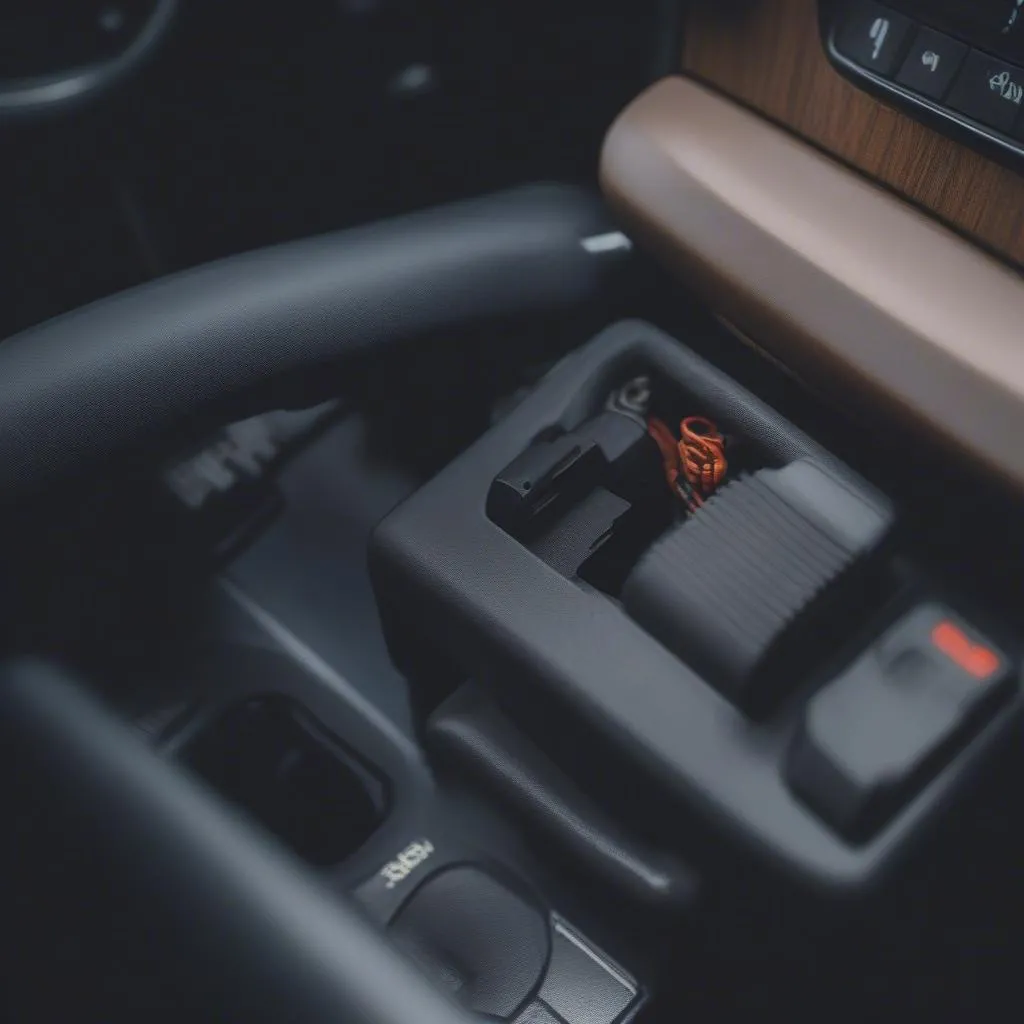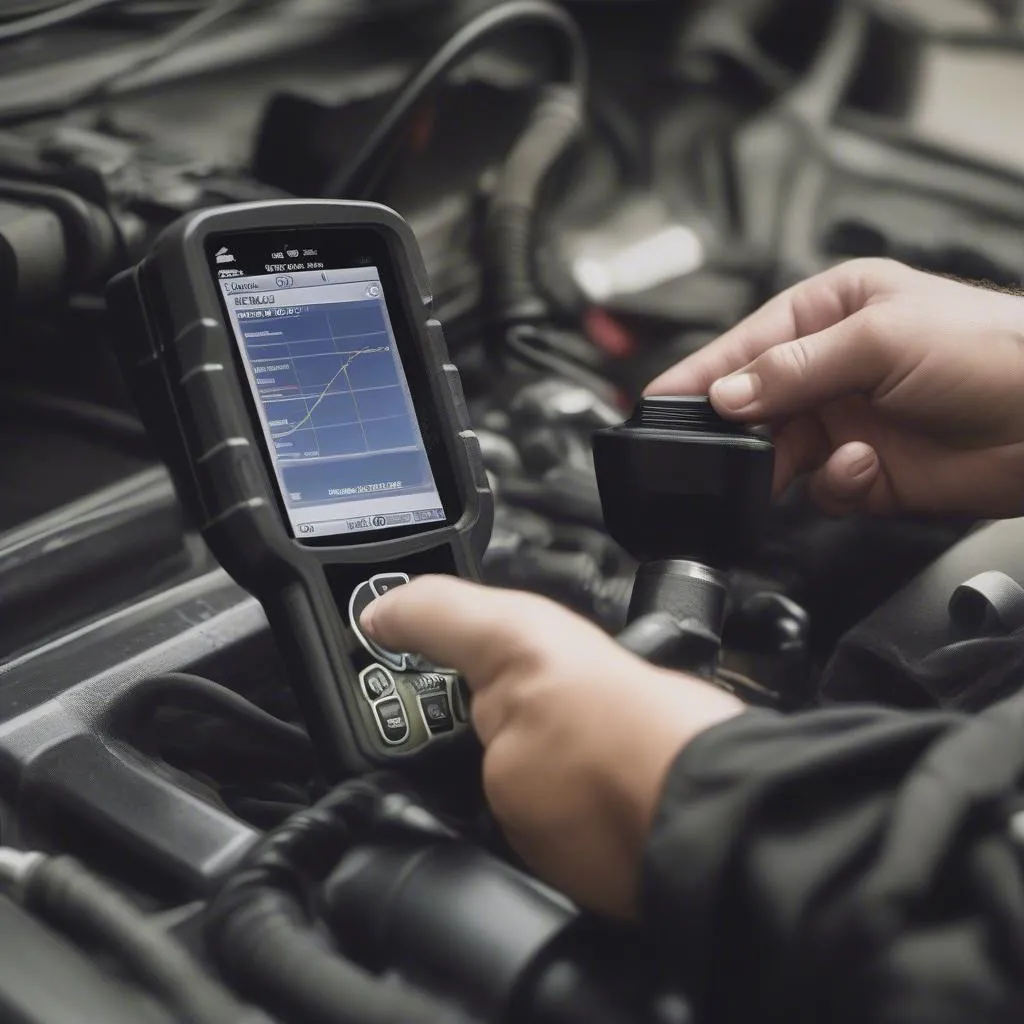Imagine this: you’re cruising down Route 66 in your trusty Jeep Wrangler, wind in your hair, the open road stretching before you. Suddenly, the “check engine” light throws a wrench in your plans. Before panic sets in, remember that little port under your dashboard, the one that often gets overlooked. That, my friend, is the OBD port, your window into your Jeep’s soul (or at least its engine).
Decoding the Jeep Obd Port: What Does it Do?
Whether you’re a seasoned mechanic or a Jeep enthusiast, understanding the OBD port is crucial. Let’s break it down:
The OBD Port: Your Jeep’s Diagnostic Hotline
“OBD” stands for On-Board Diagnostics. Think of the OBD port as a direct line of communication between your Jeep’s computer system and the outside world. It allows you to:
- Read and Clear Diagnostic Trouble Codes (DTCs): Remember that pesky “check engine” light? The OBD port helps you understand why it’s on.
- Monitor Engine Performance: Curious about your Jeep’s fuel efficiency or emissions? The OBD port can reveal a wealth of data about your engine’s performance.
- Customize Vehicle Settings: Some Jeep models allow you to adjust certain vehicle settings through the OBD port, such as door locking preferences or alarm sensitivity.
A History Lesson: From Basic Codes to Advanced Diagnostics
The OBD system has come a long way since its inception. Early versions, like OBD-I, used basic codes and often required specialized tools to decipher. Today, OBD-II, which became mandatory in most vehicles starting in 1996, including Jeeps, offers a standardized system that’s more user-friendly.
Where is the OBD Port Hiding in Your Jeep?
For most Jeep models, you’ll find the OBD port conveniently located under the driver’s side dashboard, typically somewhere between the steering wheel and the driver’s side door. It’s usually a black, rectangular port with a 16-pin connector. Still can’t find it? Refer to your owner’s manual for the exact location.
Pro Tip: If you’re having trouble locating your Jeep’s OBD port, try using a flashlight and a small mirror to peek under the dashboard.
 Jeep Obd Port Location" width="1024" height="1024">Jeep OBD Port Location
Jeep Obd Port Location" width="1024" height="1024">Jeep OBD Port Location
Common Questions About Jeep Obd Ports:
1. Can I Use Any OBD Scanner on My Jeep?
While most OBD-II scanners will work on Jeeps manufactured after 1996, keep in mind that some scanners are designed for specific makes and models. For the most accurate readings and to access advanced features, consider investing in a Jeep-specific scanner or a high-quality universal scanner.
2. Can I Reset My Jeep’s Check Engine Light Myself?
Yes, you can use an OBD scanner to clear diagnostic trouble codes and reset your check engine light. However, it’s crucial to address the underlying issue that triggered the light in the first place. Simply resetting the light without fixing the problem could lead to more serious issues down the road.
 Jeep OBD Scanner
Jeep OBD Scanner
3. What if My Jeep’s OBD Port is Not Working?
A malfunctioning OBD port can be frustrating. Here are a few things to check:
- Blown Fuses: A blown fuse could be the culprit. Consult your owner’s manual to locate the fuse related to the OBD port.
- Wiring Issues: Damaged or loose wiring can also cause problems. Inspect the wiring around the port for any visible damage.
- Faulty OBD Port: In rare cases, the port itself could be faulty and require replacement.
Beyond the Basics: Advanced Diagnostics and Tuning
For Jeep enthusiasts and professional mechanics, dealer-level scan tools, like those designed for European cars, can unlock a whole new level of diagnostics and customization. These advanced tools allow you to:
- Access Module-Specific Codes: Dive deeper into your Jeep’s systems, accessing codes and data from individual modules, such as the transmission control module (TCM) or body control module (BCM).
- Perform Bi-directional Controls: Go beyond simply reading codes. These tools let you perform active tests, such as commanding a fuel injector to cycle or testing a solenoid.
- Program and Configure Modules: In some cases, dealer-level tools are required to program new modules or configure existing ones.
Seeking Expert Advice
Remember, while DIY diagnostics can be helpful, it’s always wise to consult with a qualified mechanic for complex issues or before attempting any repairs yourself. A professional can properly diagnose problems, ensure your Jeep is repaired correctly, and help you avoid costly mistakes.
Related Resources:
- Troubleshooting Common Jeep OBD Port Issues
- Understanding Jeep Diagnostic Trouble Codes
- Finding the OBD Port Location on Different Jeep Models
Need help diagnosing a tricky engine problem or installing a new car diagnostic tool? Don’t hesitate to reach out! Our team of auto repair experts is available 24/7 to provide support. Contact us via Whatsapp at +84767531508 for personalized assistance.
Your Jeep’s health is important. Understanding its OBD port empowers you to take control of its maintenance and ensure a smooth ride for miles to come.